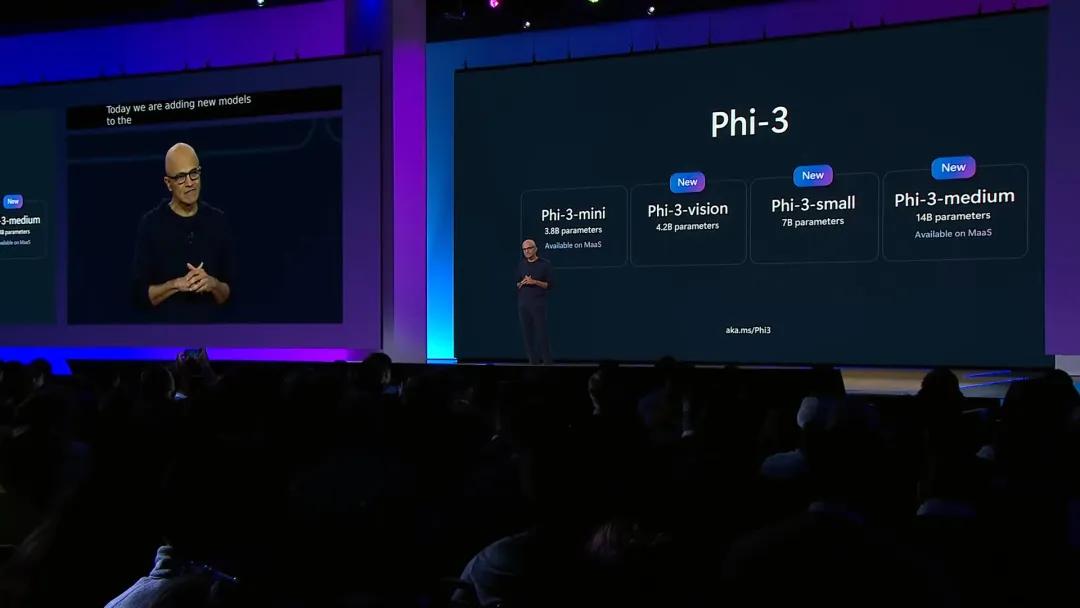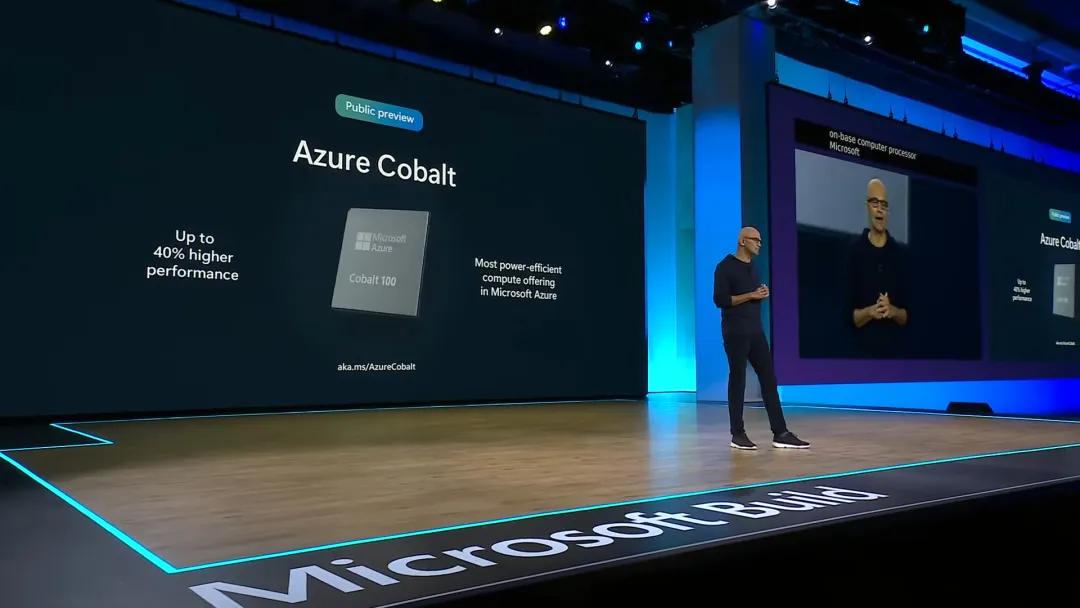Microsoft launches more than 50 AI updates

On May 21, local time, at the Microsoft Build 2024 developer conference keynote speech, including Microsoft CEO Satya Nadella, Microsoft executives introduced a range of AI-related updates, including Team Copilot, the new Agent feature, and new members of the Phi-3 model series. Partner OpenAI’s CEO Sam Altman also made a surprise appearance, urging developers and entrepreneurs to seize the “platform transformation” opportunity and claiming that “the next important model is about to arrive.”
Nadella confidently stated in his speech that Microsoft “has the most comprehensive scalable AI infrastructure to meet your needs in this AI era.” He talked about two dreams for the next ten years of modern computing: “First, can computers understand us, rather than us having to understand computers? Second, how can computers help us efficiently reason, plan, and process information in this world of ever-growing information?”
According to Dazhihui VIP, on May 21, Microsoft’s (Nasdaq: MSFT) stock closed at $429.04 per share, up 0.87%, with a total market value of $319 billion. At the launch event on February 21, Microsoft unveiled Team Copilot, an AI assistant that has been upgraded from a personal assistant to a team assistant. It is expected to launch a preview version to enterprise users later this year, allowing users to call Copilot in collaboration tools such as Teams, Loop, and Planner, where it can serve as a meeting host, help track and manage project progress, and more.
Microsoft also introduced a new Agent feature for Copilot Studio, a customizable ChatGPT building tool, allowing developers to create “intelligent Copilot” agents that respond proactively to data and events based on specific tasks and functions. These agents can independently manage complex business processes, such as processing orders on an e-commerce platform.
Previously, Microsoft open-sourced the small language model Phi-3-mini on its website, which generated a lot of excitement in the open-source community. At the event, Microsoft also launched three multi-modal models in the Phi-3 series, including Phi-3 Vision, which supports text and image input, Phi-3 Small 7B, which is slightly larger, and Phi-3 Medium 14B, which offers good value for money. Users can start using these models on Azure immediately.
In addition, Microsoft enhanced its AI-based end-to-end analytics platform Microsoft Fabric, introducing “real-time intelligence” capabilities that provide users with real-time data analysis services and enable them to quickly process and respond to large amounts of data.
In terms of hardware, Microsoft emphasized its close partnerships with major vendors such as NVIDIA and AMD. According to the introduction, by using advanced AI accelerators, Microsoft can provide high-performance and low-cost solutions for various AI applications, such as reducing the generation cost of GPT-40 by a factor of 12 and increasing the response speed by six times.
In the self-developed chip area, Microsoft has also made new progress, announcing that it will release Arm architecture chip Cobalt 100 in November, with a performance improvement of up to 40%.
In addition, Microsoft officially launched the Azure ND MI300X v5 virtual machine series, becoming “the first cloud service provider to provide AMD’s leading MI300X AI accelerator chip, helping customers meet their AI training and inference needs.”
In the closing remarks of the keynote speech, Microsoft’s “old friend” Ultraman also made a surprise appearance, joining Microsoft CTO Kevin Scott in marveling at “a crazy week” and “a crazy year.”
Ultraman said that models are becoming increasingly “intelligent” and “useful”: “But fundamentally, this amazing emergent property seems to have actually improved the general model’s universal capabilities. This will continue to happen.”
When Scott suggested that Ultraman give developers some advice, Ultraman said, “This may be the most exciting time ever to build any product or start a business. I can say with certainty that there has never been a more exciting time since the internet era… We haven’t experienced a platform shift for a while, but now we are going through such a period. So, my most important advice is to make the most of this special time.”
However, Otman also stressed that don’t expect AI to do away with all jobs: “AI itself is a new enabler, but it does not automatically break business rules.”
As for the recent exodus of employees from OpenAI, Otman’s words seem to have made a veiled response: “We did a lot of work to make GPT robust and secure. OpenAI created many teams to ensure that the large models work as expected.”
It is worth noting that just last week, Google launched a series of updates for its large model Gemini at the I/O developer conference, showcasing AI assistant project Project Astra driven by the upgraded Gemini, video model Veo that targets Sora, and an AI search engine that supports multi-modal input and the sixth-generation Tensor processing unit (TPU) Trillium chip, among other things.
It seems that Google is trying to regain its leading position in AI research, while Microsoft’s AI path is more focused on productivity improvement, targeting the “blue-collar” market. The emergence of Team Copilot also shows Microsoft’s emphasis on the B-end market. In this wave of AI hype, Microsoft is indeed becoming a comprehensive AI solutions provider.
Some media outlets have analyzed that due to Microsoft’s huge investment in AI assistant Copilot, Microsoft’s investors are eagerly waiting for the return on investment. Although Microsoft claims that the new AI tools will help boost sales, the company has not disclosed the number of Copilot




熱門頭條新聞
- Hong Kong Pavilion First Show in China International Cartoon & Animation Festival
- 2024 Hong Kong Animation and Video Game Festival
- Revolutionizing Legal Work: How Robin AI Accelerates Contract Review
- TyFlow brings Stable Diffusion AI directly into 3ds Max
- Gamescom 2024
- TRANSFORMERS: GALACTIC TRIALS HEADS TO CONSOLES AND PC THIS OCTOBER
- STAKE YOUR CLAIM IN KINGDOM, DUNGEON, AND HERO OUT NOW ON STEAM
- MBC’s Shahid platform announces premiere of ‘Grendizer U’
